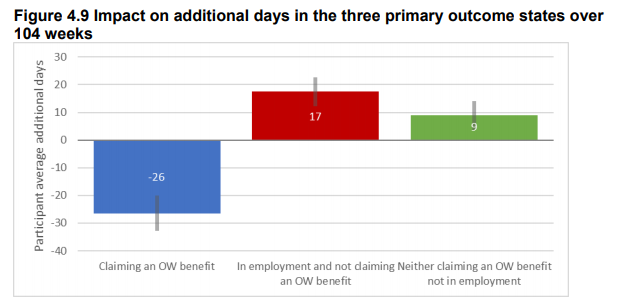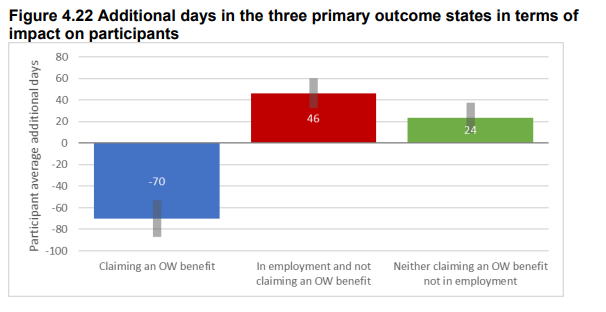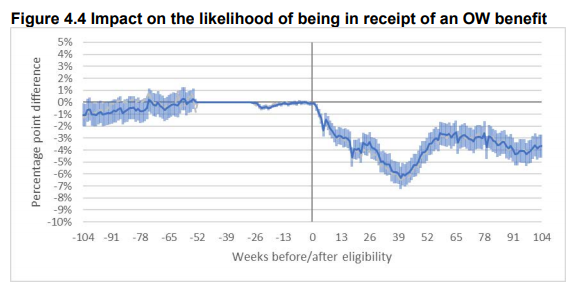So right in time to announce new help for long-term unemployed - evidence from @DWP that the Work Programme had pretty big positive impacts. H/T @AdamCoutts. Quick thread.
https://www.gov.uk/government/publications/the-work-programme-impact-assessment
Key">https://www.gov.uk/governmen... finding here - fewer days on benefit, more days in work, more doing neither. 1/
https://www.gov.uk/government/publications/the-work-programme-impact-assessment
Key">https://www.gov.uk/governmen... finding here - fewer days on benefit, more days in work, more doing neither. 1/
The approach looks pretty robust. Focuses on the 12 month plus unemployed , and compares those referred in last three months of Work Prog with those who reached 12 months u/e in the quarter after Work Prog ended (using Propensity Score Matching). Various validity checks too. 2/
I suspect this under-estimates impact as Work Prog was winding down by the end. Also, over half of those eligible *were not referred*. The evaluation includes this group, which further dampens the observed impact. Graph below shows far better results if only focus on referrals 3/
Looking at additional employment and off-benefit impacts over time, graphs below show that these sustain. This is important and good to see, as often in these sorts of programmes there is reversion over time. Note though, quite a large group neither on bens nor in work... 4/
The analysis also estimates positive ££ impacts for exchequer overall and for individuals themselves, even over just a two year view.
All told these are impressive results and look pretty robust. Real impacts may be higher still.
But there are a couple of caveats here 5/
All told these are impressive results and look pretty robust. Real impacts may be higher still.
But there are a couple of caveats here 5/
First, tyranny of averages. We know from our own evaluation that this did not work for everyone - esp older people, health conditions, most disadvantaged.
The avg positive effect likely hides very big positives for some, and weaker effects (or no/ negative ones) for others 6/
The avg positive effect likely hides very big positives for some, and weaker effects (or no/ negative ones) for others 6/
And second, we don& #39;t know from this evaluation what explains these results. Our evaluation and wider literature suggests it& #39;s good quality 1:1 help, regular contact, focus on jobs, employer engagement, etc. 100% PBR and black box? Not so sure. Need to draw right lessons. 7/
So what does this mean for what comes next?
Well, the timing is great as it means Chancellor tmrw can say that he& #39;s building on success. Also strengthens case for contracted out, centrally commissioned programme based on 1:1 help.
But we can improve on it too, in lots of ways 8/
Well, the timing is great as it means Chancellor tmrw can say that he& #39;s building on success. Also strengthens case for contracted out, centrally commissioned programme based on 1:1 help.
But we can improve on it too, in lots of ways 8/
e.g. a shorter service period (9-12 months); better links with local services; stronger service standards/ guarantees for participants; better quality mgt and oversight; more access to specialist help; and commissioning health/ disability separately.
Lots we can learn from 9/9
Lots we can learn from 9/9
Oh and one more point!
This may of course say more about the effectiveness of the counterfactual than of the Work Programme.
e.g. if JCP services for the 12 month plus group after Work Programme ended were poor, then Work Prog could look very good indeed by comparison...
This may of course say more about the effectiveness of the counterfactual than of the Work Programme.
e.g. if JCP services for the 12 month plus group after Work Programme ended were poor, then Work Prog could look very good indeed by comparison...

 Read on Twitter
Read on Twitter





